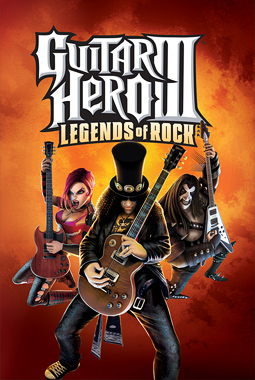The reseach was based on cluster groups who came together in June 2010 and were put into groups. Theese groups included children from different primary school and support was given by different teachers. The pupils had to work together as a 'band' on Guitar Hero and compete against the other groups. This meant that the children were put into a situation and had to problem solve and figure things out together. The children had to chose roles, for example; a singer, a guitarist, a drummer, a bang manager. This meant that they were recognising their own strengths and evaluating others, whilst getting to know one another. This also involves the priniple of personalisation and choice from Curriculum for Excellence.
"The curriculum should respond to individual needs and support particular aptitudes and talents. It should give each child and young person increasing opportunities for exercising responsible personal choice as they move through their school career" Scottish Government (undated, no page given).
- The children were able to look at their own talents and draw from their strengths to help them chose a suitable role in the group.
- The children were taking on responsibility for a particular role and therefore had a duty within the group to take on.
- Starting these experiences in the primary school, taking them into secondary school and hopefully moving on with the skills learned during their school career and later life.
Guitar Hero was used throughout primary 7 and S1 as a context for learning which provided continuity for the children. The Scottish Government (undated, no page given) stated that "each stage should build upon earlier knowledge and achievements. Children should be able to progress at a rate which meets their needs and aptitudes". The context enabled this and the children could continue what they started in primary school in secondary. This also meant that children were not faced with the unknown in secondary school and could feel confident in their ability. Secondary teachers used Guitar Hero as a focus and discussion point through lessons which helped to build on positive aspects and negative aspects of the children's experience. This meant the research could be monitored.
Allowing the children to visit the secondary school with their bandmates meant children were familiar with the different settings of a high school. This also gave them some self-worth and confidence with their surroundings.
To conclude, I feel using games based learning as a tool for easing transitions from primary 7 into secondary school is extremely effective and helpful for children. It allows them to focus on the learning, more so than the transition itself. It also helps to build stronger relationships in the secondary classroom, between peers and pupils and teachers. The chidlren have a chance to participate and be equal in a task, building on their strong/weak points and collaborating with others.
References
Pollard. A, (2008) Reflective Teaching. 3rd Ed. London: Continuum.
Scottish Government. (undated). Principles for Curriculum Design: Understanding the Curriculum. Available at http://www.ltscotland.org.uk/understandingthecurriculum/howisthecurriculumstructured/principles/index.asp [accessed 06.02.12]


A very interesting post that was informative. Will you use Guitar Hero when you are a teacher?
ReplyDeleteYou need to moderate your comments.
ReplyDelete